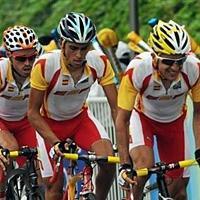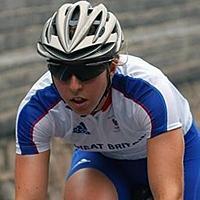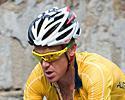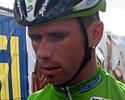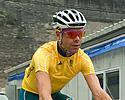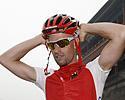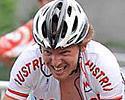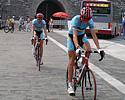First Edition Cycling News, August 10, 2008Edited by Laura Weislo Spain asserts its dominance in Beijing
With arguably the strongest teams in the Olympic men's road race, it wasn't surprising that it was Spain and Italy vying at the line for the gold medal in Beijing. But rather than a sprint between defending champion Paolo Bettini (Italy) and pre-race favourite Alejandro Valverde (Spain), the finish came down to the somewhat unexpected duo of Samuel Sánchez and Davide Rebellin. Both are champions in their own right, and both have paid their dues working for team-mates in the past. Yet, in hindsight the outcome of Saturday's race should not come as much of a shock to those who have followed the careers of these two riders, especially considering the profile of the final circuit which included a long, gradual climb followed by a rapid descent into an uphill sprint to the line. Sánchez has a history of winning stages with his daredevil descending, and packs a powerful sprint which he's used to take two stage victories in last year's Vuelta a España in addition to his win in the final time trial. Rebellin showed prowess on this type of course at Paris-Nice in March, when he clinched the overall victory from Dutchman Robert Gesink on the penultimate stage simply by out-descending him. At the end of that stage, he out-sprinted his next nearest competitor to seal the overall win. With all eyes on Bettini and Valverde, having another teammate in the winning move may have been the only chance to assure a medal. In the end, it was Sánchez who had the most power left in his legs, and was able to jump away with enough force to give himself time to cross himself and raise his arms in disbelief ahead of Rebellin.
Cyclingnews will cover the 60th edition of
the Dauphiné Libéré live
as of stage 4 on Wednesday, June 10, at approximately 15:00 local Europe
time (CEST)/ 23:00 Australian time (CDT)/ 9:00 (USA East). Valverde agreed that his team controlled the race. First they put Tour de France winner Carlos Sastre into the large move which went clear on the way to the circuits, and then Alberto Contador launched an attack when that group was caught. The Giro d'Italia winner was pulled into service to bring back a late break which threatened in the final 50km. But rather than the team's Grand Tour winners or Valverde going with the winning move on the final lap, it was Sánchez who marked the right riders and rode into the gold medal spot. "The Spanish team was the strongest one and we showed it!" Valverde said proudly after the race. "Samuel Sánchez's victory is on of great satisfaction for the entire team. He was able to dominate a difficult situation at the end. "Personally I felt good and had no problem with the hot weather," continued the Spanish champion, "but considering the fact that I was – together with Paolo Bettini – one of the biggest favourites everybody looked at us and there was little we could do. Samuel was able to take advantage of the situation and to give Spain its first medal in these Olympic games." Rebellin, always magnanimous, was clearly disappointed but had nothing but praise for Sánchez. "It's great to be on the Olympic podium; I would have like to have won of course, and I've had a lot of second places, but this is a special second place. Samuel Sánchez was the strongest today, I think the strongest were Sánchez and Andy Schleck, when they attacked it wasn't easy to go with them." Go to Cyclingnews' full report, results and photos of the men's Olympic Road Race. Cooke: heading for the bullseye in Beijing
Nicole Cooke is one of cycling's outstanding talents, but a lack of victories in World Championships and Olympic Games leave a hole in the young Welshwoman's palmares, one that she is determined to fill. Cyclingnews' Ben Atkins has been following the British champion's progress on the way to this weekend's big showdown. Nicole Cooke has had a plan this year: to win gold in the Olympic road race in Beijing. Balked at being denied the opportunity to go to Sydney in 2000 because of her then tender age of 17, she set out for Athens even more determined than usual. Fifth place from the group behind the winning move of Sara Carrigan and Judith Arndt could have been seen as a success by many, but it merely spurred Cooke on to make sure everything was right going into the race this time. The plan for this season has been for Cooke to focus entirely on arriving in Beijing in her best possible condition, with the best team at her disposal. But what is it about the Olympic games that puts it so far above all the other races in the women's peloton? "Well, I think, probably as you saw at the Tour de l'Aude [where Cooke raced in May with her Great Britain team]," said Cooke, "even the prestigious stage races and races outside of the Olympics and the World Championships, they are prestigious and very competitive, but nothing in terms of the World's media that the Olympics gets. "There's that," she continued, "and also the Olympics is the Olympics and I think definitely in women's cycling everyone wants to be on top form to try and win that race." As well as getting Cooke's own form right, the second part of the plan has been to construct a Great Britain team that is powerful enough to support her; something that has been lacking in past championships. To this end, the Halfords-Bikehut team was created, incorporating much of the national federation in what British Cycling's performance director David Brailsford has referred to as a "Pro-Nat" set up. Because of its close ties to the national federation the team has been able to race under the Great Britain colours, drafting in Olympic team member Emma Pooley from the Specialized Designs for Women team to allow her and Cooke to race together. "I think it's all about getting more experience together really," Cooke explained, "just spending time together training and racing, which we have been doing. It's not really so much them working for me, but us all working together, because as a team everyone will achieve more than if we go as individuals. I think that's really our mentality and approach. It's better to have a strong team that's united and strong tactics." Fans, family upset with lack of access
The Olympic road race course, like most cycling events, was to be free access for most of the route allowing fans to catch a glimpse of their countrymen or favourites without having to purchase a ticket. Yet when cycling enthusiasts and even family members of riders tried to get into the venue, they were turned back by Chinese security. According to ABC online, some fans, who had walked for hours in the stifling heat, took matters into their own hands and broke through security fences and shouted at the officials that they wanted to see the cycling. The Sydney Sun-Herald reported that the wife of Australian Cadel Evans was one of those turned back by security. Chiara Passerini, Evans' Italian wife, climbed a 10-metre wall to wave the Australian flag in support of her husband. The family of Mattew Lloyd took a different route, and paid off security to get in. "We arrived here and the policeman didn't want us to stay, he wanted us to stay behind a fence, so we jumped on the other side of the fence and climbed up on this wall," Passerini said during the race. "The policeman didn't know what to do and he looked like he panicked almost, so we just stayed here where we are and didn't move and we're still here. It's fantastic! ... I think there's just a little bit too much control, though. It's a bit ridiculous." The lack of spectator access is not only concern to the fans, but to the riders as well. Stuart O'Grady was disappointed when his wife travelled all the way to China only to watch on TV. The lack of cheering fans made an already difficult race harder. "It was like silent murder," he told FoxSports. "The pain was there but there was no screaming no cheering so it was very bizarre," he said of the closing circuits. "The Tour de France is popular because it is free to the people and the people have close access. I think that probably got in the way of their ideas of controlling people here." Officials reportedly will ask the Chinese to relax their security to allow more fans on the road side for the time trial, but fans hoping to catch Sunday's women's race may still face some of the same difficulties. Casper named as Tour's fifth positive
Frenchman Jimmy Casper (Agritubel) was named Saturday as the rider who tested positive for glucocorticoids during the Tour de France, one of seven riders to be found with the drug in his system but the only one who did not carry a Therapeutic Use Exemption for the drug. Casper blamed an error in his paperwork for the problem, and said he did not use the drug for performance enhancement, but to treat his asthma. Casper finished came in outside the time limit on the stage to Alpe d'Huez and did not finish the Tour. "I am asthmatic," Casper told AFP. "I did not take it as a performance boost, but for my treatment. For the twelve years I have raced I have had a TUE for the [asthma] product Syndicort. My previous TUE, which was to expire on May 29, covered the drug. On the next, there has been another product, Becotide. This product caused the positive control. "I do not know who has been negligent, if the error came from me or the [team] doctor," said Casper. He has asked for leniency from the French Federation (FFC) and the International Cycling Union (UCI) A similar situation occurred last year when Rabobank's Pedro Horrillo had an incorrect TUE which resulted in a positive test after the Brabantse Pijl in April, 2007. He was later cleared of doping charges. While Horrillo was not suspended by his team, Casper's Agritubel squad took a more conservative approach. "For the moment, we have temporarily suspended him," Agritubel manager David Fornes said to AFP. "If the Federation suspends him, we will begin a procedure for dismissal." Evans recovered, possible for time trial
Australian Cadel Evans seems to have recovered from the minor knee injury he sustained during a post-Tour de France slip-up. The Tour runner-up slipped and fell at a party, and announced earlier this month that he would not contest the timed event on Wednesday. But a strong performance in Saturday's road race, which saw him on the brink of making the winning selection, may change his mind. "I would say [I'm] 60-40 at this point," he told The Australian. "The body is OK. There's no knee problems - I'll have plenty of ice." Evans was his country's sole rider for the time trial before his injury, but then the Australians were awarded a wildcard spot in the event, which it gave to three-time world champion Michael Rogers. Should Evans decide to contest Wednesday's event, he would therefore not deprive Rogers of a chance to race. The accident Evans had following the Tour de France isn't the first time he's suffered from knee pain. He had to take a break in May to recover from tendonitis which he blamed on time spent working on his aerodynamic position for the time trial. Just as he recovered from his earlier problems, Evans seems to have rebounded from his latest setback. The Sydney Morning Herald reported Australia's coach Shayne Bannan, as more optimistic about Evans' chances at the time trial. "We'll have a chat with Cadel tomorrow. Cadel's really pleased with the way he came through it, he felt strong, particularly in the last few laps. So it wouldn't surprise me if Cadel also is switched on for the time trial," he said. Evans found himself in a select group of attackers coming into the final laps, but chose to sacrifice his chances for his compatriot Michael Rogers instead. Rogers took sixth. "For Cadel to get off the bike today and think that riding the time trial is going to be a favourable option, that shows that he is pretty pleased with the way the knee felt during the day," Bannan said. Too hot for the Germans
The heat, humidity and pollution did in the German team in Beijing, but their failure to make the podium may more likely rest on the fact that they just didn't have a good day. Fabian Wegmann was the only one of the four German starters to make it to the finish. He came in 21st. "I am simply disappointed," said Jens Voigt, who dropped out in the next-to-last circuit after spending much of the day in the leading group. "We weren't strong enough on the climb. Of course, I would have liked to have ridden two fewer laps, but everyone had the same conditions. We shouldn't look for excuses," he told Sid. Bert Grabsch was also in the lead group with Voigt, and dropped out when the group was caught with 100 km to go. "I didn't feel strong enough to have a say in the final outcome, and wanted to have enough strength left over for the time trial. I am satisfied with my performance," he wrote on his website, bertgrabsch.de. Despite the overwhelming heat and humidity of over 90 percent, he still enjoyed the experience, "especially riding through Beijing, where there were so many frenetic fans." The first to leave the race was sprinter Gerald Ciolek. "I had a bad day, it felt like altitude training," the 21 year-old told the dpa. Stefan Schumacher had been the team's hope for a medal, but he only made it for five laps. "At first I had good legs, but in the fourth lap I got a headache," he said. "It disappeared, but when it came back, it was unbearable." Looking back, he said, "The whole race was torture. The pressing heat, and then the smog. That just did me in." "It was the expected heat battle," said Directeur Sportif Hans-Michael Holczer. "I had feared this. Schumi had problems with the heat all week." (SW) Austrians satisfied
Christian Pfannberger gave his all to get a medal Saturday, attacking out the leading group and going into the last lap with a 20 second advantage. "But the head wind was so strong, that my lead was just too small," the Austrian told laola1.at. "My goal was a medal, he said. "That's why I set everything on one card at the end and hoped that it would work out. I can't blame myself for anything. I became Military World Champion with such an attack. I had this chance for a medal and otherwise it didn't matter if I ended up fourth or fiftieth." He came in 23d. His Austrian team-mate, Thomas Rohregger, also was satisfied. "We didn't miss by much, even though the conditions today were extreme. ... But for a medal, everything has to go right on the day. We were only a small team, but we can leave with our heads held high." Team manager Klaus Kabasser saw it similarly. "Peformance-wise, both were excellent. We really hope for Pfannberger's attack to work. Both riders set a high standard for the women riders." (SW) Aerts "formidable"
Belgian coach Carlo Bomans was pleased with his team's performance in the Olympic men's road race, even though his highest finisher was Mario Aerts. The 33-year-old was called in to replace Stijn Devolder on the team, and rode to an eighth place finish in his first Olympic Games. "What a formidable performance from Mario Aerts! Actually I had never expected that he would do something like that here," Bomans gushed. "If you see who he had to compete against, then you can only admire him." Looking at his other riders, Bomans told the belga news agency, "Maxime Monfort was just not good enough today, no more and no less. But he is still highly motivated for Wednesday's time trial." "The other three have certainly done what we expected of them. Jurgen Van den Broeck and Johan Vansummeren both did what they had to do, and Christophe Brandt did well too today." Vansummeren went with a counterattack in the penultimate lap which fell victim to the relentless chase of the Spanish team, and finished 42nd. He and Aerts were the only two Belgians to complete the race. (SW) (With additional editorial assistance from Susan Westemeyer.) (All rights reserved/Copyright Future Publishing (Overseas) Limited 2008) |

|
January 2009 |
Recently on Cyclingnews.com |

